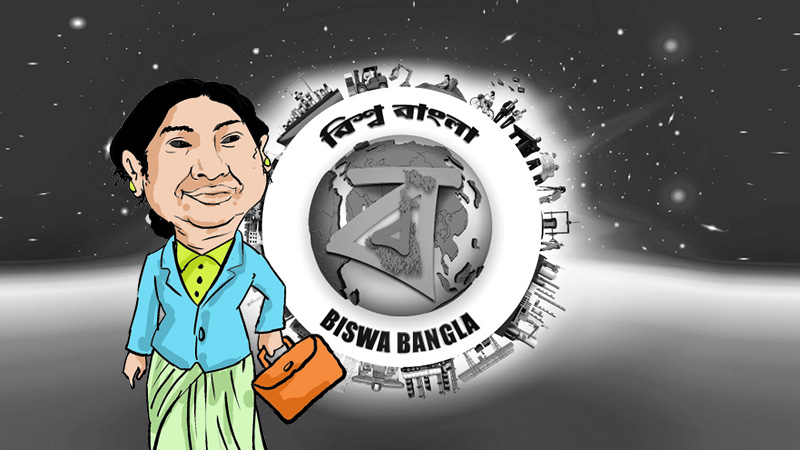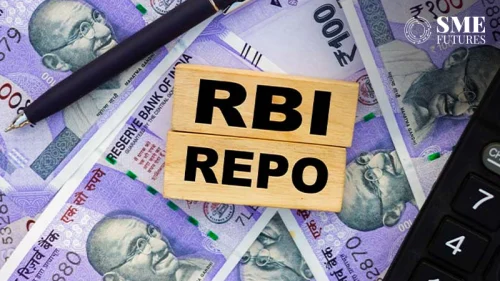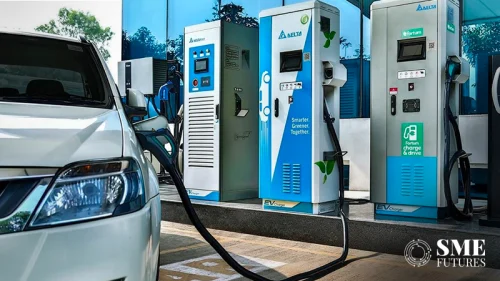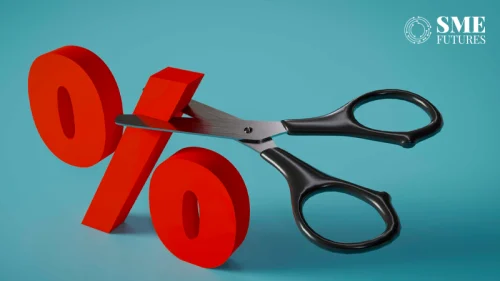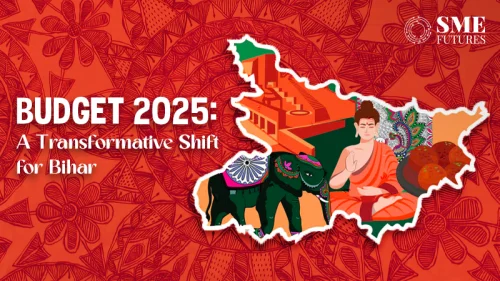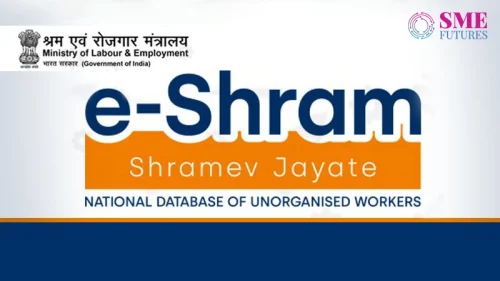Small is big. Well, yes in West Bengal, where an industrial revolution of sorts is being powered by the micro, small and medium enterprises, or the MSME, sector. Little wonder then that the state today tops the list for the number of MSMEs in the country, leaving behind the likes of Gujarat and Maharashtra that carry the tag of “industry majors”.
With 52,69,814 units, that account for 11.62 per cent of MSMEs in the country, West Bengal sits proudly at the top of the list, according to the 2016-17 MSME ministry’s annual report. West Bengal is followed by Uttar Pradesh and Maharashtra in this list. Gujarat, with 4.89 per cent of the MSME share, is at the eighth position. The top ten Indian states account for 70 per cent of the approximate 4.53 crore MSME units in the country.

The dominance of West Bengal is not just in the numbers. The ministry’s report indicates that in 2017, the eastern state witnessed the highest bank credit flow to the MSME sector at USD 15 billion. This bears testimony to the fact that the MSME sector in West Bengal is alive and kicking. Today, West Bengal is at the top of the Department of Industrial Policy and Promotion’s Business Reforms Action Plan-2017 list, which includes all the states and Union territories.
The MSME push
The MSME segment is critical to country’s development plans as it accounts for about six per cent of the GDP, 33 per cent of the manufacturing and 45 per cent of exports in the country, according to some estimates. It was in this context that the Mamata Banerjee government held the fourth edition of the Bengal Global Business Summit.
Thirty countries from across the globe participated in the two-day event. Industry bigwigs including Mukesh Ambani, Arcelor Mittal’s Lakshmi Mittal, Sajjan Jindal, Sanjiv Puri of ITC, Sanjiv Goenka of RPG were all there to join hands with the state government and become partners in this evolving success story.
The last two editions of the BGBS have helped the state attract a combined investment of nearly Rs 4,93,000 crore and seen the signing of 110 MOUs. The 2018 edition kept the momentum going and saw an investment intention worth Rs 2.2 lakh crore.
Despite these impressive numbers and prominent guests from the corporate world, the biggest takeaway from the summit was for the MSME sector. It bagged proposals in excess of Rs 52,000 crore. The value of these proposals re-established West Bengal’s leadership in the MSME domain. But, what did representatives from the industry feel about the renewed focus on the sector at the event?
The 2018 BGBS summit had a special participant in the form of Shiv Agarwal. An electronics designer, who worked both at Apple and Microsoft in the US, Agarwal had a special bonding and connection with West Bengal. As a college student in Kolkata, Agarwal, together with his friend Spandan, had designed a simple two-layer printed circuit board (PCB) for an electronics venture they wanted to start. Since they could not find PCB manufacturers in the state, they figured out a process to home-brew motherboards.
At that time, Kolkata’s electronics market did not stock the common components that they had used in their design. The duo had to alter the design approach to accommodate for old technology parts. Subsequently, the venture died because it was not based on a scalable, modern framework. It was the first time since their childhood that Kolkata was failing to fulfil the young enthusiast’s material needs and expectations.

Agarwal tried to start two more innovative engineering ventures while still in college, a highly efficient water turbine and then a low-cost neonatal incubator. Both failed to click due to a lack of engineering infrastructure and testing facilities and a lot of red tape.
Realising that West Bengal’s infrastructure was too old to support modern product development, his friends moved out of Kolkata. “We moved out of the country with the intent to hone our engineering skills and come back to our roots one day. I went to Stanford, California, while Spandan moved to KTH, Sweden,” said Agarwal.
At the Bengal Global Business Summit, Agarwal attended a panel discussion which had a healthy mix of bankers, industrialists, government officials and international business delegates. The aspiring industrialist felt that for the MSMEs to thrive on national and international level, they needed to innovate and keep on perfecting their approach to increase production quality. He had a word of advice for the administrators. “The government needs to enforce compliance regulations to weed out low-quality products, which create noise in the market and force good companies to compete on price rather than on quality. It was also encouraging to hear the veterans speak about topics of Industry 4.0 and the role of industrial IoT products,” he said.
Agarwal, who had the experience of going through the end-to-end process of shipping a consumer electronics device, said. “The design phase includes vetting component vendors for part specifications, reliability and availability. A lot of these vendors are MSME companies, which are concentrated in few countries, like Korea, Israel, Germany and China, specialising in manufacturing a very specific part and doing it really well,” he said.
Agarwal considers the West Bengal government’s promotion of “business clusters” – which is a concentration of interconnected businesses, suppliers and associated groups – for increasing productivity a tried-and-tested approach and feels the endeavour will benefit the state tremendously. “The government is thinking in the right direction. But, the devil is in the details. The government will do well if it puts together an experienced execution team, sets clear expectations and regulates deliverables. One of the fundamental goals of any MSME sector is to create employment. But, a metric of just ‘how many new jobs’ were created can be misleading. There needs to be quality jobs too, requiring specialised labour to produce standard products. This will further push healthy regulations, like employees’ minimum wage, product environmental compliance, etc,” he warned.
MSMEs plus start-ups
While the implicit theme of the 2018 event seemed to be MSMEs, the explicit focus was on start-ups. The summit saw the presence of ex-Infosys honcho Mohandas Pai, who has become a sort of guiding spirit to young entrepreneurs apart from being an investor.
The event had a plenary session on start-ups. Selected and mentored by the state government and the IIMC Innovation Park members, six start-ups from various sectors like health-tech, clean-tech, data science and food-tech, were pitched before a full house. For the chosen six, the platform was like a springboard that not just helped them showcase their ideas but also provided them with valuable business opportunities.
Angshuman Bhattacharya, CEO and co-founder of SIBIA Analytics, is excited about the prospects the platform had provided to his predictive analytics start-up that offers solutions to retail and consumer products businesses across the globe. “It was a very beneficial engagement for us. We have been benefited from it and look forward to signing several agreements in the next few months as a follow up from such networking,” he said.
Bhattacharya was all praise for the kind of attention the West Bengal government had given to MSMEs during the summit. “The SMEs got a lot of attention during the Bengal Global Business Summit. The state government has rightly observed that they can be the growth engines, especially in a state which is the biggest hub of such entrepreneurs,” he said.
The SIBIA Analytics CEO also lauded the state government’s move to start its own venture fund in association with SIDBI. This fund is dedicated for start-ups in West Bengal. “I am sure that many of us will benefit from this fund. There is another fund from Webel also. The state policy for MSMEs provides support and financial benefits, including capital investment sharing and tax sops, to entrepreneurs like us,” he said.
Indranil Aich, an entrepreneur in the field of financial services and infrastructure consulting, has been attending the summit since its inception and also invited to many other states’ investment programmes, like Advantage Assam and Magnetic Maharashtra. Aich feels that the BGBS has been the best in terms of attracting a large number of investors. The presence of almost 30 countries in the summit was the key differentiator, he feels.

Aich, a member of the Confederation of Indian Industry and the National SME Council and co-chair of the committee on services, said that supporting industries are likely to get a boost in both manufacturing and services sectors. “Mining, infra and financial services will also see a huge number of MSMEs prospering in the next five years. SMEs in tourism, mining and financial services will benefit the most,” he said.
He added that the formulation of fintech policy to encourage finance and credit reach to the farthest point in districts and villages is what the government should focus on for now.
The investment destination
The summit also won appreciation from several members of the Achievers, Leaders, Founders Forum of Assocham (ALFA), a network of second-generation entrepreneurs from the state. According to them, West Bengal, the fourth largest state economy in the country, was business ready and had shown its commitment towards inclusive and sustainable development with its open embrace to the global investor community.
“The past editions of the Bengal Global Business Summit have proven to be milestones in terms of establishing Bengal as an ideal investment destination. The business opportunities that the BGBS offers are spread across a multidimensional orbit of sectors including industrial infrastructure, manufacturing clusters, hospitality sectors, educational bodies, IT & ITES, transport, tourism, healthcare, etc. The intent of the government is definitely towards promoting micro, small and medium enterprises to flourish in West Bengal,” ALFA members said.
However, they questioned the role of the corporates in helping the state government build an entrepreneurial ecosystem in the state. “It is not just the responsibility of government but also of the large corporates to promote, nurture, built and co-create entrepreneurs. But, are the corporates doing enough for the state?” questioned the young minds.
Roopen Roy, former managing director of PricewaterhouseCoopers, India, and Deloitte Consulting, India, and presently the founder and CEO of Sumantrana, a strategy advisory firm, strongly vouched for the ease of procedural hassles, stringent labour laws and economic regulations in order to turn growth into a mass movement. “With a special focus on entrepreneurship, stakeholders need to engage with Central ministries [and institutions], such as Niti Ayog and Ministry of Skill Development and Entrepreneurship, and the relevant ministries in West Bengal to take the agenda forward. They should work with state and Central governments in terms of policy issues and advocacy to improve the ease of doing business across the country,” advocated Roy.
It is an accepted fact that MSMEs cannot dedicate a lot of resources to testing their products. In the developed countries, this responsibility is either taken up by specialised government agencies or universities. In India, the Central and state governments need to make sure that such facilities are made available to this sector. West Bengal already has an entrepreneurial spirit and a scientific approach. The government needs to keep up with the global best practices to help and promote such individuals and companies.

